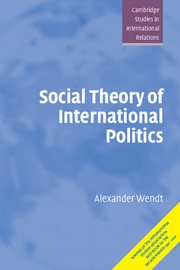Book contents
- Frontmatter
- Contents
- Acknowledgements
- Dedication
- 1 Four sociologies of international politics
- Part I Social theory
- 2 Scientific realism and social kinds
- 3 “Ideas all the way down?”: on the constitution of power and interest
- 4 Structure, agency, and culture
- Part II International politics
- Bibliography
- Index
- Miscellaneous Endmatter
3 - “Ideas all the way down?”: on the constitution of power and interest
Published online by Cambridge University Press: 05 September 2012
- Frontmatter
- Contents
- Acknowledgements
- Dedication
- 1 Four sociologies of international politics
- Part I Social theory
- 2 Scientific realism and social kinds
- 3 “Ideas all the way down?”: on the constitution of power and interest
- 4 Structure, agency, and culture
- Part II International politics
- Bibliography
- Index
- Miscellaneous Endmatter
Summary
In post-war scholarship the starting point for most theorizing about international politics has been power and national interest, with power understood ultimately as military capability and interest as an egoistic desire for power, security, or wealth. This is usually identified with a Realist approach to the subject. While conceding the importance of power and interest, in the early 1980s Neoliberals began to argue that international institutions also play a significant role in international politics. Neorealists and Neoliberals disagree about their relative weight, but they would probably agree that together the three factors explain most of the variance in international outcomes. Moreover, although adherents of neither approach tend to call themselves “materialists,” both Neorealists and Neoliberals routinely refer to power and interest, and sometimes even institutions, as “material” factors. Against this materialist consensus a number of IR scholars today are emphasizing a fourth factor, “ideas.” This focus goes back at least to Snyder, Bruck, and Sapin, who pioneered a tradition of cognitivist research on the role of belief systems and perceptions in foreign policy decision-making. But it has really taken off in the last decade with multiple lines of theorizing, both mainstream and critical, about identity, ideology, discourse, culture, and, simply, ideas. In other words, materialist assumptions are no longer unproblematic in IR theory, and materialist scholars are facing a resurgent idealism that puts the question of “what difference do ideas make?” clearly on the table.
There are two ways to approach this question, and thus two ways to frame the idealism-materialism debate.
- Type
- Chapter
- Information
- Social Theory of International Politics , pp. 92 - 138Publisher: Cambridge University PressPrint publication year: 1999
- 7
- Cited by

